![]()
![]()
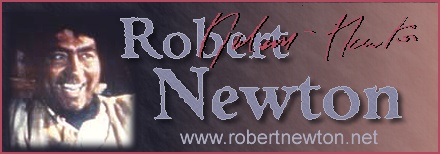
![]()
A
Guide for Robert Newton Fans
Disclaimer: The perspectives expressed here are strictly my personal opinions as a long-time fan of Robert Newton. I'm no cinema expert, and my reactions frequently diverge from those of the professional critics. Further, they do not represent the opinions of anyone who has contributed to or assisted with this site other than myself. They are posted by popular request in hope that they will serve as a guide for others and stimulate discussion. I hope you'll see these films for yourself, and, whether you agree or disagree with me, I'd love to read your thoughts on the discussion forum .
This page is continually under construction. Opinions expressed (or maybe just the wording of them) are subject to change!
~ Susan
Titles are listed in alphabetical order. Where alternate titles are given, reviews appear with the one I liked best. ;-)
|
Film Rating Scale:
|
||
|
*****
|
One of his best, a must-see
|
|
|
****
|
|
A good film; I enjoyed it
|
|
***
|
Worth seeing
|
|
|
**
|
Didn't like it but worth seeing
for Newton's performance
|
|
|
*
|
For die-hard fans only!
|
|
A B C D E F G H I J K L M N O P Q R S T U V W X Y Z
Alfred Hitchcock Presents: "The Derelicts" (TV episode, B&W, 1955) Newton stars as a British gentleman turned "derelict" who awakens from a bender in an American park one night just in time to witness a murder, then seizes the opportunity to blackmail the wealthy culprit. He gives just the right touch of malevolent charm and ironic humor to this neat little Hitchcockian tale. He even gets to quote a little Shakespeare! (Hitchcock and Newton seem to work so well together, it's a shame they didn't get the chance to collaborate more often.) *****
Androcles
and the Lion (B&W, 1953) 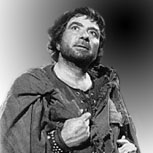 Newton
plays the gentle giant Ferrovius in this George Bernard Shaw comedy set
in ancient Rome—a fierce warrior turned devout Christian who must
fight the temptation to return to his former nature when tormented by
Romans. This star-studded extravaganza is silly but entertaining, and
RN is funny and gets some great lines.
However, his supporting role seems to have been intended as a cross between
Newton's ferocious Blackbeard and his gentle, wise Dr.
Arnold, and the resulting hybrid doesn't quite work for me. (Several
other actors, especially Jim Backus as a Roman centurion, seem seriously
miscast, but Alan Young, of Mr. Ed fame, is convincingly
affable as the animal-loving title character.) ***
Newton
plays the gentle giant Ferrovius in this George Bernard Shaw comedy set
in ancient Rome—a fierce warrior turned devout Christian who must
fight the temptation to return to his former nature when tormented by
Romans. This star-studded extravaganza is silly but entertaining, and
RN is funny and gets some great lines.
However, his supporting role seems to have been intended as a cross between
Newton's ferocious Blackbeard and his gentle, wise Dr.
Arnold, and the resulting hybrid doesn't quite work for me. (Several
other actors, especially Jim Backus as a Roman centurion, seem seriously
miscast, but Alan Young, of Mr. Ed fame, is convincingly
affable as the animal-loving title character.) ***
Around
the World in 80 Days (color, 1956) Be sure you have plenty of time
to savor this fun but slow-paced three-hour visual feast. (Unfortunately,
it loses a lot in the "translation" to the small screen, so
get the letterbox version—or see it on the big screen!—if you
can. 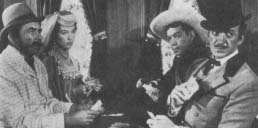 In
the TV version, for example, Robert Newton has been edited from the card-playing
scene pictured here—making David Niven's parting shot at him somewhat
less meaningful.) The plot, which revolves around the fastidious Phileas
Fogg's (David Niven's) titular trek, undertaken in order to win a bet,
often takes a back seat to the lavishly filmed scenery and local color
in the many places he and his valet, Passepartout (Cantinflįs), visit
along the way. Many have criticized the length of the film, with its extended
layovers and seemingly gratuitous multitude of star cameos, and it can
be difficult to understand how it managed to beat out such competition
as Giant to win a Best Picture Oscar. However, succumbing to the
urge to fast-forward through these seemingly extraneous scenes on one
of my repeat viewings revealed that the leisurely pace does have a purpose:
It gives the viewer the feeling of actually having accompanied Fogg on
his long voyage—along with a sense of his urgency to get on to the
next stop. On the other hand, it is quite clear why the film won
for Best Cinematography, even in edited-for-TV format. In his last film
role, Robert Newton first appears almost an hour into the film as Inspector
Fix, a Scotland Yard detective who suspects Fogg of having robbed the
Bank of England. He catches up with Fogg and company just after they leave
Spain and, feigning friendship while awaiting the right moment to arrest
his quarry, tags along with them for the rest of their adventures. He
has some entertaining scenes and adds much humor as the devious but hapless
detective. ****
In
the TV version, for example, Robert Newton has been edited from the card-playing
scene pictured here—making David Niven's parting shot at him somewhat
less meaningful.) The plot, which revolves around the fastidious Phileas
Fogg's (David Niven's) titular trek, undertaken in order to win a bet,
often takes a back seat to the lavishly filmed scenery and local color
in the many places he and his valet, Passepartout (Cantinflįs), visit
along the way. Many have criticized the length of the film, with its extended
layovers and seemingly gratuitous multitude of star cameos, and it can
be difficult to understand how it managed to beat out such competition
as Giant to win a Best Picture Oscar. However, succumbing to the
urge to fast-forward through these seemingly extraneous scenes on one
of my repeat viewings revealed that the leisurely pace does have a purpose:
It gives the viewer the feeling of actually having accompanied Fogg on
his long voyage—along with a sense of his urgency to get on to the
next stop. On the other hand, it is quite clear why the film won
for Best Cinematography, even in edited-for-TV format. In his last film
role, Robert Newton first appears almost an hour into the film as Inspector
Fix, a Scotland Yard detective who suspects Fogg of having robbed the
Bank of England. He catches up with Fogg and company just after they leave
Spain and, feigning friendship while awaiting the right moment to arrest
his quarry, tags along with them for the rest of their adventures. He
has some entertaining scenes and adds much humor as the devious but hapless
detective. ****
The
Beachcomber (color, 1954) This 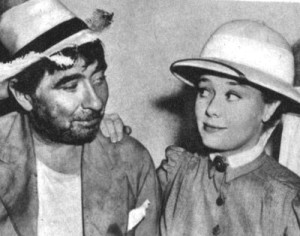 lighthearted
romance is somewhat predictable yet enjoyable. RN is more charismatic
in the title role of the resident hard-drinking British ne'er-do-well
on a tropical island paradise in this remake than Charles Laughton was
in the 1938 original (a.k.a. Vessel of Wrath).
However, in contrast to Elsa Lanchester in the original, Glynis Johns
is cloyingly demure as the prim missionary who first detests then falls
in love with him. I sensed little chemistry between the two leads, and
just why these opposites should suddenly attract each other is never really
made clear. ****
lighthearted
romance is somewhat predictable yet enjoyable. RN is more charismatic
in the title role of the resident hard-drinking British ne'er-do-well
on a tropical island paradise in this remake than Charles Laughton was
in the 1938 original (a.k.a. Vessel of Wrath).
However, in contrast to Elsa Lanchester in the original, Glynis Johns
is cloyingly demure as the prim missionary who first detests then falls
in love with him. I sensed little chemistry between the two leads, and
just why these opposites should suddenly attract each other is never really
made clear. ****
The Beachcomber (B&W, 1938) See Vessel of Wrath
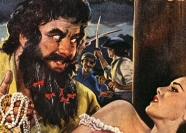 Blackbeard
the Pirate (color, 1952) It's one of his more popular films,
but, in my opinion, it's also where Robert Newton got his reputation for
overacting. He seems to be doing a caricature of his earlier interpretation
of Long John Silver, with his every line seeming to begin and/or end with
"arrrrr." Yet as unrestrainedly cartoonish as he is, his is
the most convincing and enjoyable performance in the film. With the notable
exception of the delightfully funny Irene Ryan, most of the other cast
members elicit audible groans or derisive laughter in this reviewer every
time they open their mouths. It's hard to believe that this film was made
by the acclaimed director who made High Sierra, Gentleman Jim,
Desperate Journey, They Died with Their Boots On and over
a hundred other films. To make matters worse, the implausible script is
fraught with glaring historical inaccuracies
and lame attempts at humor like the following:
Blackbeard
the Pirate (color, 1952) It's one of his more popular films,
but, in my opinion, it's also where Robert Newton got his reputation for
overacting. He seems to be doing a caricature of his earlier interpretation
of Long John Silver, with his every line seeming to begin and/or end with
"arrrrr." Yet as unrestrainedly cartoonish as he is, his is
the most convincing and enjoyable performance in the film. With the notable
exception of the delightfully funny Irene Ryan, most of the other cast
members elicit audible groans or derisive laughter in this reviewer every
time they open their mouths. It's hard to believe that this film was made
by the acclaimed director who made High Sierra, Gentleman Jim,
Desperate Journey, They Died with Their Boots On and over
a hundred other films. To make matters worse, the implausible script is
fraught with glaring historical inaccuracies
and lame attempts at humor like the following:
Alvina, Linda Darnell's high-strung chaperone (played by Irene Ryan, foreshadowing her role as Granny in The Beverly Hillbillies): "I'm a lady in waiting."
Blackbeard: "Waiting? What for?"
Worley, Blackbeard's lunkheaded sidekick (William Bendix), tawkin' wid a t'ick Brooklyn accent (is the suspense killing you yet?): "For a man, most like." Duh-huh-huh-huh.
The film might have succeeded as a comedy if the stabs at humor were consistent, but the clichéd love story (acted with leaden seriousness by Keith Andes and Linda Darnell to the strains of a sentimental romantic soundtrack by Victor Young, who also scored—and won an Oscar for—Around the World in Eighty Days), the cruel deeds of the double-crossing pirates, and official taglines like, "They took what they wanted ... and they wanted the world!" and "Swashbuckling Sons of Satan! The thunder of their plundering shook the earth, the seas, the sky," all suggest that I'm laughing in the wrong places. (This film would be far more palatable had it been honored with a send-up from those professional hecklers at Mystery Science Theatre 3000.)
Blackbeard the Pirate comes off as a blatant and slipshod attempt
to cash in on Newton's wave of pirate popularity by combining it with
the infamous name (but nothing more) of Blackbeard. In it, he is inexplicably
pitted against a very robust-looking Sir Henry Morgan, who, in real life
died in chronic ill health thirty years before Blackbeard even began his
career. (And that's only the beginning of the complete departure from
historical fact.) Alas, the well-documented true
story and widely accepted legends of the dreaded pirate (also known
as Edward Teach) are far more fascinating and colorful than this frivolous
fabrication, and, with the right director, there was no one more perfect
for the role than Robert Newton. For running aground a concept with so
much potential, the filmmakers deserved to be keelhauled. My rating: Arr! ![]()
Busman's Honeymoon (B&W, 1940) Upper-class sleuth Lord Peter Wimsey (Robert Montgomery) marries crime novelist Harriet Vane (Constance Cummings). As a wedding gift, he buys her childhood home in Devon, where they spend their honeymoon. Both have sworn off their respective occupations to focus all their attention on wedded bliss. But, of course, as in all classic detective series, where Lord Wimsey goes, a murder mystery follows, hence the title of the film. (Don't be fooled by the American title Haunted Honeymoon—no murder victims return as ghosts.) The story seemed a little slow moving to me, with a lot of time spent on "wim"-sical humor rather than on advancing the plot (although my usual impatience to see more of RN may also have had something to do with it). As a supposed member of the British nobility, Robert Montgomery's undisguised American accent also troubled me a bit. He and Lady Harriet, along with their bumbling valet Bunter, are obvious forerunners to the jet-setting amateur detective team of Jonathan and Jennifer Hart and their chauffeur Max on the 1979-1984 TV series Hart to Hart, and this played a lot like a typical lighthearted TV murder mystery. RN pops up several times throughout the film as surly handyman Frank Crutchley, one of the colorful locals who become suspects. His heavy west-country accent sounds a lot like the one he would later successfully adapt for the role of Long John Silver. Though his character is not very likable, he's enjoyable to watch in this frothy but intriguing whodunit puzzle based on the novel by Dorothy L. Sayers.***
Dark Journey (B&W, 1937) As you might guess by the "name" of his character ("Officer of U-Boat"), RN has a tiny role in this predictable romance about two WWI spies on opposite sides (Vivien Leigh and Conrad Veidt) who fall in love. His five minutes of screen time occur right at the beginning, when he gives some orders to his crew (in German), then interrogates Vivien Leigh (in English, without attempting to imitate a German accent) in a convincingly authoritative performance. (As someone who's studied the language for ten years, I was pleased not to notice any annoying flaws in his German pronunciation—probably because either he's mumbling or, more likely, the sound quality on my tape was so bad that I could only understand one of his three German lines!) **
Dead
Men Are Dangerous (B&W, 1939) As Aylmer Franklin, a
struggling novelist with mounting unpaid bills, Robert Newton plays the
romantic lead with charming vulnerability. A publisher's rejection leads
to his decision that his girlfriend would be better off without him; however,
he ends up faking his own death by trading places with a man coincidentally
killed just outside Franklin's cottage. In assuming his new identity,
he becomes the prime suspect in his own murder, and a convoluted series
of incidents follows as he tries to elude the police while outsmarting
the real killer. I found the opening premise intriguing, but the remaining
tale is confusing and ultimately disappointing, with many illogical and
improbable occurrences, what seem to be irrelevant scenes, and an almost
laughably abrupt ending—perhaps a result of trying to reduce a full-length
novel into a one-hour film. Newton's performance is its main appeal. *** ![]()
The
Desert Rats (B&W, 1953) RN gives an 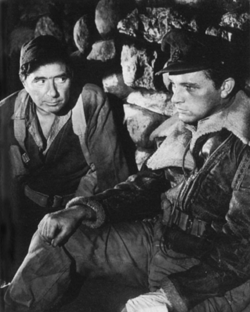 understated
and moving performance as Richard Burton's hard-drinking former teacher
who serves under him in World War II Africa and struggles to overcome
his own cowardice. I have an aversion to war movies in general, so I didn't
expect to like this, but it's not so much a war picture as it is the story
of the relationship between the two men. One of Newton's best performances.
*****
understated
and moving performance as Richard Burton's hard-drinking former teacher
who serves under him in World War II Africa and struggles to overcome
his own cowardice. I have an aversion to war movies in general, so I didn't
expect to like this, but it's not so much a war picture as it is the story
of the relationship between the two men. One of Newton's best performances.
*****
Farewell
Again (B&W, 1937) This saccharine melodrama sprinkled
with old-fashioned humor, about the crew of a military ship carrying an
army regiment home from a five-year stint in India, allowing them just
six hours in port at Southampton before setting off again for a further
two years in the Near East, reminded me of a patriotic-themed early prototype
for the late '70s cruise-ship anthology The Love Boat. It follows
the romantic predicaments of several personnel, including their kindly
and wise commanding officer (Leslie Banks) and his wife (Flora Robson),
who's hiding a tragic secret from him; to an officer (Sebastian Shaw,
who made two other films with Newton but who's probably best known today
as the scarred face behind the Darth Vader mask in Return of the Jedi)
in love with a shipboard nurse but betrothed to another; and the soldier
who saved his life, Jim Carter (Newton), who is jealously fretting that
his girlfriend Elsie hasn't just been waiting around for him back in port
all this time. His dangerous rages concern both his friend and girlfriend,
but in my opinion, not nearly enough to make the story's outcome believable.
The other stories are either predictable or corny or depend on tidy coincidences,
but like The Love Boat, I found it a highly watchable diversion. *** ![]()
Gaslight (B&W, 1940) If you're familiar with—and liked—the 1944 American version of the film (starring Charles Boyer and Ingrid Bergman), this might not compare favorably. It spoils most of the suspense right from the outset and features grating performances by its two stars, Anton Walbrook and Diana Wynyard. They make the perfect dysfunctional couple—he mentally abusive and just plain loathsome and she a nearly comatose, puppy-eyed enabler. When she finally did come to life, I was just too exasperated to care. The tedium is further dragged out by an extended dancehall scene that does little if anything to advance the storyline. You'll be especially disappointed if you're looking to see Robert Newton. He's practically an extra here, with a pivotal, two-minute scene as Wynyard's likable country cousin who comes to call on her about an hour into the film. He makes another very brief appearance (no lines) at the end. Don't blink or you'll miss him! *
The Green Cockatoo (B&W, 1937) Robert Newton is a main character in the first half of this film about a group of gangsters who fix races and take their revenge on a double-crosser. Unfortunately, neither his sympathetic performance nor the considerable charm of John Mills as his brother compensates for the almost laughable implausibility of the script: A frightened woman alone for the first time in a big city accompanies the stranger who barges into her phone booth to a hotel she's never heard of (his assurance that, "It's OK, you can trust me," is all it takes to allay her fears)? She is falsely accused of the murder of a man no one notices has already been bleeding to death for a considerable amount of time—yet she makes no attempt to defend herself? The plot is fraught with such absurdities, but identifying them all (even imagining the fun Mystery Science Theatre 3000 might have had with this film) is at least entertaining. **
Hatter's Castle (B&W, 1941) Robert Newton is pure villainy in the lead role of this relentless tragedy (based on the novel by A. J. Cronin) about a surly milliner whose cruelty and need for control destroy all he holds dear. Newton is convincingly deranged and heartless, a man with perhaps once-good intentions, now possessed by ambition and selfishness. His performance would have been even more convincing were it not for his distractingly cartoonish makeup, though it is certainly one you won't forget. But unlike other memorable villains Newton created, the character of hatter James Brodie elicits little if any sympathy. Four-time RN costar Emlyn Williams, who was also adept at infusing charm into some lowly villains, is likewise unequivocably despicable as the conniver who seduces Brodie's naive daughter, played by Deborah Kerr. James Mason plays the family physician, who truly loves her, but this study of pain and destruction seems more focused on tragedy than on redemption. Overall, it is well-crafted, with excellent performances from the entire cast, but depressing despite the gratuitously tacked-on happy ending.****
Haunted Honeymoon See Busman's Honeymoon
 Henry
V (color, 1944) Having grown up on movies and TV, with little exposure
to live theatre, I had a hard time getting past the intentionally unrealistic
sets and stagey performances in Laurence Olivier's filming of Shakespeare's
stageplay, especially when comparing it with Kenneth Branagh's gritty,
emotional, and thought-provoking 1989 version. However, most experts give
it rave reviews, and it was nominated for several Oscars, winning an honorary
award for Olivier, which prompted me to reassess my initial response.
A college course in the dramatization of Shakespeare's plays led me to
recognize the genius of Olivier's achievement. Not only does he depict
Shakespeare's story of England's historic battle against France, but he
artfully combines it with an almost documentary historicity, placing us
in Shakespeare's audience (as well as backstage) at the Globe theatre
at the turn of the 17th century. Then, as it surely did for audiences
of Shakespeare's time, accustomed as they were to relying on their imaginations
for props, lighting, and scenery, this stagey, minimalist setting melts
away, and we are gradually transported farther back, into the medieval
world of King Henry V. The settings and acting become increasingly
naturalistic as the film progresses, culminating in an outdoor battle
scene complete with real horses and armor, then become consciously artificial
again (with the sets purposely imitating the colors and lack of perspective
of a medieval painting) until we are abruptly returned to the theatre
(and thence to yet another level of reality as the film ends). Unfortunately,
editing Shakespeare for performance is a time-honored tradition, and unlike
Branagh, Olivier (emphasizing Henry's heroism at a time when England was
at war) has chosen to cut many of Pistol's (Robert Newton's) expository
scenes, while his own final scene seems to drag on endlessly. By contrast,
Branagh omitted Pistol's best and last scene, which Olivier leaves intact,
allowing RN to steal the show. In fact, as the comic relief, or "clown,"
Newton was given a particularly choice role (as evidenced by the full
title: The Cronicle History of Henry the Fift, With his Battell Fought
at Agin Court in France Togither with Auntient Pistoll) which capitalized
on his magical ability to charm an audience. His ostentatious performance—even
the way he doffs his hat and bows to the crowd at the end of his first
scene (and the audience's enthusiastic reaction), and the way he addresses
the camera in his last—recreates the way Will Kemp, the beloved clown
in Shakespeare's company at the time the play was written, would have
played the role. Even when seeing the film for the first time, I found
Newton's exaggerated gestures and mugging (and mane of floppy curls!)
highly entertaining. I still find his stuffy speech difficult to understand
at times, but fortunately, the script is readily available. Whether or
not you enjoy Shakespeare or Olivier's innovative approach to filming
this play, Robert Newton's performance (brief as it is) is a must-see
for fans. [Also see if you can recognize Ralph Truman (George Merry in
Treasure Island) as the French messenger and Leslie Banks (Joss
Merlyn in Jamaica Inn) as the Chorus. Robert Newton look-alike
Leo Genn appears as well in the role of the staid French Constable, but
there's no confusing the two in this film!] ****
Henry
V (color, 1944) Having grown up on movies and TV, with little exposure
to live theatre, I had a hard time getting past the intentionally unrealistic
sets and stagey performances in Laurence Olivier's filming of Shakespeare's
stageplay, especially when comparing it with Kenneth Branagh's gritty,
emotional, and thought-provoking 1989 version. However, most experts give
it rave reviews, and it was nominated for several Oscars, winning an honorary
award for Olivier, which prompted me to reassess my initial response.
A college course in the dramatization of Shakespeare's plays led me to
recognize the genius of Olivier's achievement. Not only does he depict
Shakespeare's story of England's historic battle against France, but he
artfully combines it with an almost documentary historicity, placing us
in Shakespeare's audience (as well as backstage) at the Globe theatre
at the turn of the 17th century. Then, as it surely did for audiences
of Shakespeare's time, accustomed as they were to relying on their imaginations
for props, lighting, and scenery, this stagey, minimalist setting melts
away, and we are gradually transported farther back, into the medieval
world of King Henry V. The settings and acting become increasingly
naturalistic as the film progresses, culminating in an outdoor battle
scene complete with real horses and armor, then become consciously artificial
again (with the sets purposely imitating the colors and lack of perspective
of a medieval painting) until we are abruptly returned to the theatre
(and thence to yet another level of reality as the film ends). Unfortunately,
editing Shakespeare for performance is a time-honored tradition, and unlike
Branagh, Olivier (emphasizing Henry's heroism at a time when England was
at war) has chosen to cut many of Pistol's (Robert Newton's) expository
scenes, while his own final scene seems to drag on endlessly. By contrast,
Branagh omitted Pistol's best and last scene, which Olivier leaves intact,
allowing RN to steal the show. In fact, as the comic relief, or "clown,"
Newton was given a particularly choice role (as evidenced by the full
title: The Cronicle History of Henry the Fift, With his Battell Fought
at Agin Court in France Togither with Auntient Pistoll) which capitalized
on his magical ability to charm an audience. His ostentatious performance—even
the way he doffs his hat and bows to the crowd at the end of his first
scene (and the audience's enthusiastic reaction), and the way he addresses
the camera in his last—recreates the way Will Kemp, the beloved clown
in Shakespeare's company at the time the play was written, would have
played the role. Even when seeing the film for the first time, I found
Newton's exaggerated gestures and mugging (and mane of floppy curls!)
highly entertaining. I still find his stuffy speech difficult to understand
at times, but fortunately, the script is readily available. Whether or
not you enjoy Shakespeare or Olivier's innovative approach to filming
this play, Robert Newton's performance (brief as it is) is a must-see
for fans. [Also see if you can recognize Ralph Truman (George Merry in
Treasure Island) as the French messenger and Leslie Banks (Joss
Merlyn in Jamaica Inn) as the Chorus. Robert Newton look-alike
Leo Genn appears as well in the role of the staid French Constable, but
there's no confusing the two in this film!] ****
The
Hidden Room (B&W, 1949, a.k.a. 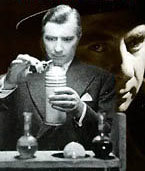 Obsession)
At the beginning of the film, I sided with the suave, eloquent, and intellectual
Dr. Clive Riordan (RN) who catches his unrepentant wife (Sally Gray) having
an affair with their American friend Bill Cronin (Phil Brown), then plots
a clever revenge. Over time, though, Cronin proves to be the more sympathetic
character, and Riordan and his wife seem to deserve each other. The verbal
cat-and-mouse games between Riordan and his foil, the equally clever police
inspector (played by British comedian Naunton Wayne), and between Riordan
and his victim are entertaining; Dr. Riordan would have been a perfect
upper-class villain for the TV detective series Columbo.
(I'll bet the creators of the show saw this film!) An excellent movie
overall. *****
Obsession)
At the beginning of the film, I sided with the suave, eloquent, and intellectual
Dr. Clive Riordan (RN) who catches his unrepentant wife (Sally Gray) having
an affair with their American friend Bill Cronin (Phil Brown), then plots
a clever revenge. Over time, though, Cronin proves to be the more sympathetic
character, and Riordan and his wife seem to deserve each other. The verbal
cat-and-mouse games between Riordan and his foil, the equally clever police
inspector (played by British comedian Naunton Wayne), and between Riordan
and his victim are entertaining; Dr. Riordan would have been a perfect
upper-class villain for the TV detective series Columbo.
(I'll bet the creators of the show saw this film!) An excellent movie
overall. *****
Jamaica
Inn (B&W, 1939) In my experience, it's always a mistake to
read the novel upon which a film is based until after I've seen the film.
 In
this case, Daphne du Maurier's
original is so much better—and so drastically different—that
I now have a hard time not comparing and finding fault with the film version
even though I saw it first and enjoyed it at the time. Nearly all the
suspense and character development have been lost from du Maurier's spellbinding
tale. In fact, she and director Alfred Hitchcock were so displeased with
the resulting script that both distanced themselves from the film as much
as they could. Playing a composite character expanded from the book, a
grotesquely made-up Charles Laughton dominates this romantic adventure
about a band of 19th-century smugglers on the coast of Cornwall. As the
bombastic Squire Humphrey Pengallan, Laughton overshadows perennial Newton
costar Leslie Banks in the role of Joss Merlyn, the proprietor of Jamaica
Inn and cruel uncle (by marriage) of the heroine, Mary Yellan. The fearsome
yet intriguing main villain of the book, Joss is rendered ineffectual
and even laughable, with his absurdly unkempt hair practically standing
on end for most of the film. However, another frequent Newton costar,
Emlyn
Williams, is just right as the delectably reptilian Harry the Pedlar,
Joss' right-hand man.
In
this case, Daphne du Maurier's
original is so much better—and so drastically different—that
I now have a hard time not comparing and finding fault with the film version
even though I saw it first and enjoyed it at the time. Nearly all the
suspense and character development have been lost from du Maurier's spellbinding
tale. In fact, she and director Alfred Hitchcock were so displeased with
the resulting script that both distanced themselves from the film as much
as they could. Playing a composite character expanded from the book, a
grotesquely made-up Charles Laughton dominates this romantic adventure
about a band of 19th-century smugglers on the coast of Cornwall. As the
bombastic Squire Humphrey Pengallan, Laughton overshadows perennial Newton
costar Leslie Banks in the role of Joss Merlyn, the proprietor of Jamaica
Inn and cruel uncle (by marriage) of the heroine, Mary Yellan. The fearsome
yet intriguing main villain of the book, Joss is rendered ineffectual
and even laughable, with his absurdly unkempt hair practically standing
on end for most of the film. However, another frequent Newton costar,
Emlyn
Williams, is just right as the delectably reptilian Harry the Pedlar,
Joss' right-hand man. 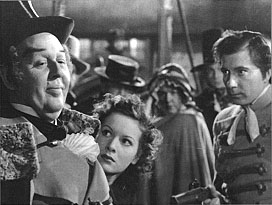 Laughton's
new discovery Maureen O'Hara is perfect as the feisty Mary, and Robert
Newton is ruggedly romantic and idealistically heroic as Jem Trehearne,
an undercover law officer sent to investigate the goings-on at the inn.
(In the book, Jem was Joss's enigmatic, less-than-law-abiding younger
brother.) The scenes with O'Hara and Newton were invented for the film
but, thanks in part to the chemistry between them, are enchanting, and
that, combined with Williams's gleefully sardonic malevolence, is enough
to make this one of my favorite Newton films. The 1985
Jane Seymour/Trevor Eve/Patrick McGoohan made-for-TV version is more
faithful to the book, although overlong, and the cinematography wonderfully
showcases the gorgeous Cornish scenery—but missing are the magical
performances of Newton, O'Hara, and Williams and, of course, the directing
talents of Hitchcock. If only the two versions could be combined ... ***
Laughton's
new discovery Maureen O'Hara is perfect as the feisty Mary, and Robert
Newton is ruggedly romantic and idealistically heroic as Jem Trehearne,
an undercover law officer sent to investigate the goings-on at the inn.
(In the book, Jem was Joss's enigmatic, less-than-law-abiding younger
brother.) The scenes with O'Hara and Newton were invented for the film
but, thanks in part to the chemistry between them, are enchanting, and
that, combined with Williams's gleefully sardonic malevolence, is enough
to make this one of my favorite Newton films. The 1985
Jane Seymour/Trevor Eve/Patrick McGoohan made-for-TV version is more
faithful to the book, although overlong, and the cinematography wonderfully
showcases the gorgeous Cornish scenery—but missing are the magical
performances of Newton, O'Hara, and Williams and, of course, the directing
talents of Hitchcock. If only the two versions could be combined ... ***
Kiss
the Blood Off My Hands (B&W, 1948) Burt Lancaster 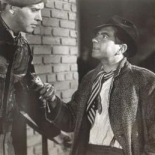 plays
Bill Saunders, an emotionally scarred Canadian veteran of a Nazi POW camp.
One night in a British pub, he loses his temper over an innocent statement
by the owner and slugs him. The blow proves fatal, and Saunders finds
himself running from the police. He ducks into an apartment window and
grabs its occupant (Joan Fontaine), covering her mouth to prevent her
from screaming and giving him away. Thus begins their romance. Meanwhile,
Cockney con man Harry Carter (Robert Newton) has witnessed the murder
and seems to be shadowing Saunders, reappearing throughout the film with
increasingly insistent offers of shady deals in which to involve him.
In a forerunner to his less villainous role in Alfred Hitchcock Presents,
RN is irresistible as he goes from mysterious conniver to menacing fiend.
I didn't find Saunders to be quite the "flawed hero" that the
film tries to present him as, however—with his repeated outbursts
of unwarranted and unlamented violence, it was hard for me to sympathize
with him at all, but I did feel sorry for his girlfriend Jane. ****
plays
Bill Saunders, an emotionally scarred Canadian veteran of a Nazi POW camp.
One night in a British pub, he loses his temper over an innocent statement
by the owner and slugs him. The blow proves fatal, and Saunders finds
himself running from the police. He ducks into an apartment window and
grabs its occupant (Joan Fontaine), covering her mouth to prevent her
from screaming and giving him away. Thus begins their romance. Meanwhile,
Cockney con man Harry Carter (Robert Newton) has witnessed the murder
and seems to be shadowing Saunders, reappearing throughout the film with
increasingly insistent offers of shady deals in which to involve him.
In a forerunner to his less villainous role in Alfred Hitchcock Presents,
RN is irresistible as he goes from mysterious conniver to menacing fiend.
I didn't find Saunders to be quite the "flawed hero" that the
film tries to present him as, however—with his repeated outbursts
of unwarranted and unlamented violence, it was hard for me to sympathize
with him at all, but I did feel sorry for his girlfriend Jane. ****
Long
John Silver (color, film: 1954/TV series: 1955) Long John
Silver the movie (a.k.a. Long John Silver Returns to Treasure Island)
plays like—and essentially is—three episodes of Long
John Silver the Australian TV series (a.k.a. The Adventures of
Long John Silver) tacked together. 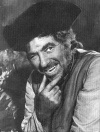 As
such, it seems a bit overlong and disjointed. In the feature, several
famous scenes from Treasure Island (such as Jim Hawkins overhearing
and dutifully reporting on Long John's plot to overtake a ship and the
pirate's repeated inability to carry out his threats against the righteous
lad) are rehashed rather unsubtly. In the film, though the character of
Long John gets to show a humorous side, he still has a bit of an edge,
but in the series he has been completely defanged and turned into a lovable
if mischievous (and parrotless) children's hero. Which is OK if you don't
go back and compare it with Disney's original Treasure Island or
Stevenson's book, where Silver is a self-serving schemer with no compunctions
about committing murder to get what he wants, and whose heart of buried
gold is unearthed only by young Jim Hawkins. In the film and the series,
Silver has settled down with his lovably mischievous crew on the fictional
island of Porto Bello, located (according to an antique map—superimposed
with the somewhat inaccurate caption "The Spanish Main"*—shown
in the opening credits of the series) in the middle of the Bahamas—about
where Andros Island ought to be, except it's the wrong shape. (The real
Porto Bello was a Spanish harbor town on the Isthmus of Panama famous
for its brutal sacking by the pirate Henry Morgan in 1668.) Following
the titular return to Treasure Island in the feature film—with the
help of a reproduction of Robert Louis Stevenson's own treasure-map sketch—Long
John spends his days doing good deeds and living at the Cask and Anchor
inn owned by Purity Pinker. Purity is played by plump character actress
Connie Gilchrist, who makes no effort to alter her anachronistic Brooklyn
accent for the role. Most of the intentional humor, on the other
hand, involves Silver's attempts to elude his hostess's romantic advances
while remembering on which side his bread is buttered. Of course, the
show wouldn't be complete without Treasure Island's ostensible
hero, and when Jim Hawkins (Kit Taylor) coincidentally finds himself unsupervised
on Porto Bello, Purity and "Lawng Jawn" become his default guardians.
Viewed in child-sized half-hour portions, the TV show ranges from entertaining
and well written to slightly cheesy, but it's always colorful and chock
full of good pirate dialog. RN really seems
to enjoy himself in this role, and his enthusiasm is contagious. He goes
just enough over the top to make it fun. Even the opening credits for
the series are a treat to be enjoyed again and again. Overall rating for
both the series and film: ***
As
such, it seems a bit overlong and disjointed. In the feature, several
famous scenes from Treasure Island (such as Jim Hawkins overhearing
and dutifully reporting on Long John's plot to overtake a ship and the
pirate's repeated inability to carry out his threats against the righteous
lad) are rehashed rather unsubtly. In the film, though the character of
Long John gets to show a humorous side, he still has a bit of an edge,
but in the series he has been completely defanged and turned into a lovable
if mischievous (and parrotless) children's hero. Which is OK if you don't
go back and compare it with Disney's original Treasure Island or
Stevenson's book, where Silver is a self-serving schemer with no compunctions
about committing murder to get what he wants, and whose heart of buried
gold is unearthed only by young Jim Hawkins. In the film and the series,
Silver has settled down with his lovably mischievous crew on the fictional
island of Porto Bello, located (according to an antique map—superimposed
with the somewhat inaccurate caption "The Spanish Main"*—shown
in the opening credits of the series) in the middle of the Bahamas—about
where Andros Island ought to be, except it's the wrong shape. (The real
Porto Bello was a Spanish harbor town on the Isthmus of Panama famous
for its brutal sacking by the pirate Henry Morgan in 1668.) Following
the titular return to Treasure Island in the feature film—with the
help of a reproduction of Robert Louis Stevenson's own treasure-map sketch—Long
John spends his days doing good deeds and living at the Cask and Anchor
inn owned by Purity Pinker. Purity is played by plump character actress
Connie Gilchrist, who makes no effort to alter her anachronistic Brooklyn
accent for the role. Most of the intentional humor, on the other
hand, involves Silver's attempts to elude his hostess's romantic advances
while remembering on which side his bread is buttered. Of course, the
show wouldn't be complete without Treasure Island's ostensible
hero, and when Jim Hawkins (Kit Taylor) coincidentally finds himself unsupervised
on Porto Bello, Purity and "Lawng Jawn" become his default guardians.
Viewed in child-sized half-hour portions, the TV show ranges from entertaining
and well written to slightly cheesy, but it's always colorful and chock
full of good pirate dialog. RN really seems
to enjoy himself in this role, and his enthusiasm is contagious. He goes
just enough over the top to make it fun. Even the opening credits for
the series are a treat to be enjoyed again and again. Overall rating for
both the series and film: ***
Favorite episode: "Ship
o' the Dead" This early episode, like the later "Sword
of Vengeance" (in which the words "ship o' the dead" are
again evoked), involves the discovery of a mysteriously unmanned ship
found drifting off Porto Bello. Both episodes are well written and suspenseful.
The first half of "Sword of Vengeance" includes plenty of action
aboard Silver's ship, the Faithful, and a power o' fine pirate
talk, while the second half features a spectacular swordfight reminiscent
of the famous onscreen duels of Errol Flynn and Basil Rathbone. However,
"Sword of Vengeance" is peculiar in that, halfway through, the
plot suddenly veers off into what seems like a pilot for a spin-off: The
sole survivor rescued by Silver's crew (the dashing Owen Weingott) seeks
to avenge his father's death and rescue the woman he loves, relegating
Newton and company to supporting characters for the rest of the episode.
(This keeps it from the top spot among my favorites.) Also notable is
the complete absence of Purity and Jim Hawkins from the episode. Perhaps
this is Owen Weingott's vengeance for having been forced to serve as an
uncredited minor character both in the Long John Silver film and
in "Ship o' the Dead"! In "Ship o' the Dead," Jim,
out sailing alone one day in his sloop, discovers a mysterious ship littered
with corpses. Silver stands by him in his report to the governor until
the evidence is shown to contradict Jim's story and he is thought a liar
by everyone including his disappointed guardians. Certain of what he saw,
Jim sets out alone to solve the mystery and save the day, seeming truer
to Robert Louis Stevenson's original conception of the character than
in any other episode. As in "Sword of Vengeance," there's more
shipboard action than usual here, and the pirates actually attempt to
earn their unsavory livings/titles. Rating: ****
Least favorite episode:
"Turnabout" The script for this silly slapstick episode
belongs on a cheesy Saturday morning cartoon show of the 1970s. The "hilarity"
starts with a Frenchman slipping on a banana peel, and it's all downhill
from there. In another scene, a tall man perfunctorily disguised as a
woman garners the romantic attentions of the very men he's trying to escape!
Ha ha! (I'd have given a spoiler alert, but it's hard not to see that
one coming a mile away.) Phony French accents abound. It's as if the writers
were trying to see how many clichéd gags they could cram into the
space of 25 minutes. They even throw in the old "plum-duff-in-the-face"
routine—and guess who gets it! Rating: **
Major
Barbara (B&W, 1941) RN gives another classic performance  here
as Bill Walker, a Cockney street tough whose soul is targeted for redemption
by a Salvation Army worker (Wendy Hiller). This is obviously a precursor
to roles like Bill Sikes and Long John Silver. Unfortunately, among the
principals, only Deborah Kerr's, Emlyn
Williams', and RN's acting seems natural in this heavy-handed George
Bernard Shaw satire. The overbearing performances of the leads—especially
Robert Morley and Rex Harrison—dripping with self-conscious irony,
seem to belong on the stage rather than close up on camera, and I wanted
to bop Harrison on the head with those infernal drum beaters. By contrast,
Newton gives his many funny and clever lines
just the right amount of innocent bravado and poignancy, and his simple
charm makes this one of his best performances. Without his presence and
that of the other supporting players, the second half of the film seems
to drag on interminably. **
here
as Bill Walker, a Cockney street tough whose soul is targeted for redemption
by a Salvation Army worker (Wendy Hiller). This is obviously a precursor
to roles like Bill Sikes and Long John Silver. Unfortunately, among the
principals, only Deborah Kerr's, Emlyn
Williams', and RN's acting seems natural in this heavy-handed George
Bernard Shaw satire. The overbearing performances of the leads—especially
Robert Morley and Rex Harrison—dripping with self-conscious irony,
seem to belong on the stage rather than close up on camera, and I wanted
to bop Harrison on the head with those infernal drum beaters. By contrast,
Newton gives his many funny and clever lines
just the right amount of innocent bravado and poignancy, and his simple
charm makes this one of his best performances. Without his presence and
that of the other supporting players, the second half of the film seems
to drag on interminably. **
Night Boat to Dublin (B&W, 1946) Robert Newton is handsome, charming, clever, slyly humorous, heroic, tough, and romantic in his starring role as Captain David Grant, a high-ranking intelligence officer during World War II who goes undercover in pursuit of a scientist on the verge of developing the atomic bomb for the Nazis. Along the way, he gets roped into a marriage of convenience which not surprisingly turns slowly into a sweetly awkward romance. The plot careens through an extraordinarily complex and unlikely series of twists and turns (think Mission: Impossible I meets Green Card), but even though I had trouble following every detail on the first try, I found it highly engaging and enjoyable thanks to the excellent performances of all the cast. RN has a nice chemistry with both Muriel Pavlow as the woman he marries and Guy Middleton as his military colleague and comrade. ****
Odd
Man Out (B&W, 1947) Robert Newton’s name gets a prominent
second billing 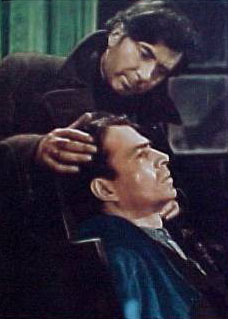 in
the opening credits, and, with his wide acclaim for his memorable performance
in this film, I was disappointed to discover that he doesn’t make
his entrance until the final half hour of this slow-moving two-hour tale.
It took me three tries to get past my impatience and into the deceptively
simple yet deep story, but it was well worth the effort to understand
it. James Mason stars as Johnny McQueen, the mastermind of an IRA bank
heist that goes awry when he is injured in a shooting and inadvertently
left behind by his cohorts. The movie chronicles the variety of characters
and situations he encounters on his tortured odyssey through the streets
of a “city of Northern Ireland.” What nearly all the characters
have in common is their lack of compassion for the wounded man. Ironically,
the most sympathetic character in the story is Johnny himself. The elevation
of this criminal to near-sainthood stretches the bounds of credibility
a bit, yet through his eyes, one finds compassion for the less enlightened
people who confront him at every turn. Among the self-centered characters
who take him in is Lukey (Newton), an eccentric, alcoholic artist obsessed
with the idea of capturing the soul on canvas. This makes Johnny, as he
looks death in the eye, Lukey’s dream subject, one he doesn’t
want to lose at any cost. (His portraits look eerily similar to the paintings
showcased weekly on Rod Serling’s macabre TV series of the late ’60’s/early
’70’s, Night Gallery.) Although it’s hard to accept
his insensitivity toward Johnny’s suffering, it’s Newton’s
complex performance itself that made me feel compassion for Lukey in the
end. The cast also includes Cyril
Cusack, who has yet to share the screen with Newton in his role here
as the bungling driver of the getaway car—a far cry from Newton’s
lovable comrade whom he plays in Soldiers Three—and there is nearly
an hour’s gap between his last scene and Newton’s first in this
film. Denis O’Dea (Treasure Island’s Dr. Livesey) plays
the police inspector who trails Mason (reminding me very much of Javert
in Les Misérables, whom Newton would play in 1952). The
cinematography/art direction in this film is gorgeous and melancholy,
with plenty of contrast, sharp detail, and interesting camera angles and
effects, and the original score is unusually haunting. Together, they
set the perfect mood for a poignant ending. ****
in
the opening credits, and, with his wide acclaim for his memorable performance
in this film, I was disappointed to discover that he doesn’t make
his entrance until the final half hour of this slow-moving two-hour tale.
It took me three tries to get past my impatience and into the deceptively
simple yet deep story, but it was well worth the effort to understand
it. James Mason stars as Johnny McQueen, the mastermind of an IRA bank
heist that goes awry when he is injured in a shooting and inadvertently
left behind by his cohorts. The movie chronicles the variety of characters
and situations he encounters on his tortured odyssey through the streets
of a “city of Northern Ireland.” What nearly all the characters
have in common is their lack of compassion for the wounded man. Ironically,
the most sympathetic character in the story is Johnny himself. The elevation
of this criminal to near-sainthood stretches the bounds of credibility
a bit, yet through his eyes, one finds compassion for the less enlightened
people who confront him at every turn. Among the self-centered characters
who take him in is Lukey (Newton), an eccentric, alcoholic artist obsessed
with the idea of capturing the soul on canvas. This makes Johnny, as he
looks death in the eye, Lukey’s dream subject, one he doesn’t
want to lose at any cost. (His portraits look eerily similar to the paintings
showcased weekly on Rod Serling’s macabre TV series of the late ’60’s/early
’70’s, Night Gallery.) Although it’s hard to accept
his insensitivity toward Johnny’s suffering, it’s Newton’s
complex performance itself that made me feel compassion for Lukey in the
end. The cast also includes Cyril
Cusack, who has yet to share the screen with Newton in his role here
as the bungling driver of the getaway car—a far cry from Newton’s
lovable comrade whom he plays in Soldiers Three—and there is nearly
an hour’s gap between his last scene and Newton’s first in this
film. Denis O’Dea (Treasure Island’s Dr. Livesey) plays
the police inspector who trails Mason (reminding me very much of Javert
in Les Misérables, whom Newton would play in 1952). The
cinematography/art direction in this film is gorgeous and melancholy,
with plenty of contrast, sharp detail, and interesting camera angles and
effects, and the original score is unusually haunting. Together, they
set the perfect mood for a poignant ending. ****
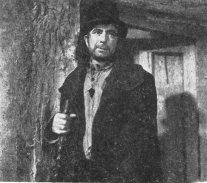 Oliver
Twist (B&W, 1948) You have to wait about half an hour for RN
to appear, but the wait makes his brilliantly filmed entrance all the
more dramatic. And that's just one of many brilliant pieces of cinematography
in the film. Newton is the best part of this David Lean classic, which
is among my favorites. Burdened with heavy make-up and an artificially
distorted voice, a young Alec Guinness is the one who goes over the top
here, while Newton gives a spellbinding performance as the evil Bill Sikes
(also spelled "Sykes," depending on whether you're reading the
credits or the "Wanted" poster in the film!). Without trivializing
his cruelty, Newton and Lean manage to give the character a human side
not found in the book or other filmed versions. If you love a good villain,
Newton's Sikes is your Man! *****
Oliver
Twist (B&W, 1948) You have to wait about half an hour for RN
to appear, but the wait makes his brilliantly filmed entrance all the
more dramatic. And that's just one of many brilliant pieces of cinematography
in the film. Newton is the best part of this David Lean classic, which
is among my favorites. Burdened with heavy make-up and an artificially
distorted voice, a young Alec Guinness is the one who goes over the top
here, while Newton gives a spellbinding performance as the evil Bill Sikes
(also spelled "Sykes," depending on whether you're reading the
credits or the "Wanted" poster in the film!). Without trivializing
his cruelty, Newton and Lean manage to give the character a human side
not found in the book or other filmed versions. If you love a good villain,
Newton's Sikes is your Man! *****
Poison Pen (B&W, 1939) Who is causing strife among the local townsfolk by spreading vicious rumors anonymously through the mail? When the accusations lead to death, the police are brought in to investigate. But by then, you've probably figured out who the culprit is and will find the rest of the film disappointingly predictable. I was also bothered by the misogynistic message the story conveys. As Sam Hurrin, one of the townspeople affected by the letters, Robert Newton has a small but important role, and his colorful performance is one of the film's saving graces. **
Race Gang See The Green Cockatoo
Schlitz Playhouse "The Baker of Barnbury" (B&W, 1951) This is a sweet and humorous fairy tale about a lonely village baker (Robert Newton) and his plan for spending—or skipping—Christmas with a lonely widow (Elsa Lanchester). RN is thoroughly delightful. Once again he speaks in his beloved pirate dialect but, serving also as the story's narrator, does it with a knowing wink. ****
Snowbound (B&W, 1948) Here is another obvious attempt to cash in on Robert Newton's box-office popularity of the late '40s. Although he has top billing, RN appears only briefly at the very beginning of the film and again for thirty seconds about fifteen minutes in, finally joining the cast as a full member in the last half hour. Dennis Price, the real star of the film, plays a writer hired by film director Newton to observe the motley group of people (including Pink Panther veteran-to-be Herbert Lom) staying at an Alpine resort, ostensibly as research for a screenplay. He soon becomes involved in their search for a hoard of hidden Nazi treasure. Many complexities of the plot are explained verbally by the characters rather than depicted, and it took me three viewings before I finally figured out the plot of this visually dull film. Also, while it is perhaps understandable for its time, I was bothered by the stereotyping of Germans (not just Nazis) as villains and Italians as charming buffoons.**
Soldiers
Three (B&W, 1951) The  critics
seem to agree that this silly Kipling-esque comedy set in British colonial
India is a total dud, but with such low expectations before seeing it,
I found this buddy flick surprisingly watchable. It had a coherent plot
and many chuckles (which is more than I can say about a lot of recent
comedy blockbusters). For some reason, Newton is still speaking like Long
John Silver, right down to the "arrrr"s. Still, he gets a lot
of screen time and entertained me in this film, which is saying a lot
considering he has to share the spotlight with the likes of Stewart Granger,
Cyril Cusack, and David
Niven. For once Newton has a little competition in the mischievous charm
department with wry Irishman Cusack, but they team up to steal the show.
If you're in the mood for a little inane fun—and forget everything you
know about Kipling—you just might enjoy it. ***
critics
seem to agree that this silly Kipling-esque comedy set in British colonial
India is a total dud, but with such low expectations before seeing it,
I found this buddy flick surprisingly watchable. It had a coherent plot
and many chuckles (which is more than I can say about a lot of recent
comedy blockbusters). For some reason, Newton is still speaking like Long
John Silver, right down to the "arrrr"s. Still, he gets a lot
of screen time and entertained me in this film, which is saying a lot
considering he has to share the spotlight with the likes of Stewart Granger,
Cyril Cusack, and David
Niven. For once Newton has a little competition in the mischievous charm
department with wry Irishman Cusack, but they team up to steal the show.
If you're in the mood for a little inane fun—and forget everything you
know about Kipling—you just might enjoy it. ***
The Squeaker (B&W, 1937) This is an interesting detective yarn unfortunately peppered with feeble attempts at humor. Edmund Lowe stars as the mysterious, off-beat "Canadian" (although his accent sounds more Brooklynese!) who helps solve the case. RN is convincing and likable in a substantial role as a debonair jewel thief on the lam whose girlfriend (Tamara Desni) is a nightclub singer. In spite of its flaws, the plot was engrossing enough to keep me watching till the end—even after Newton's character made his exit an hour into the film—ensuring that I caught the groaner of a punchline, which reminded me of a typical ending on the TV cop-show parody Police Squad! ****
They Flew Alone (B&W, 1941, a.k.a. Wings and the Woman) Newton plays Jim Mollison, the debonaire playboy pilot who competes with and marries the heroine in this true story of record-breaking 1930s flying ace Amy Johnson. RN gives depth to his costarring role as the romantic but infuriating charmer. A good film and fitting tribute to Ms. Johnson. ****
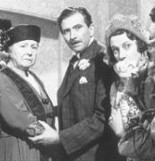 This
Happy Breed (color, 1944) This is Noėl Coward's story of an ordinary
family's travails in the years between WWI and WWII. As Frank Gibbons,
Newton is convincing as a war veteran and wise, steadfast patriarch. (It
is a while, though, before he is aged enough to look the part
of Kay Walsh's father! Walsh later played RN's abused girlfriend in another
of her real-life husband David Lean's films, Oliver Twist.) This
film is among my favorites, primarily due to Newton's gentle affability
as Gibbons. ****
This
Happy Breed (color, 1944) This is Noėl Coward's story of an ordinary
family's travails in the years between WWI and WWII. As Frank Gibbons,
Newton is convincing as a war veteran and wise, steadfast patriarch. (It
is a while, though, before he is aged enough to look the part
of Kay Walsh's father! Walsh later played RN's abused girlfriend in another
of her real-life husband David Lean's films, Oliver Twist.) This
film is among my favorites, primarily due to Newton's gentle affability
as Gibbons. ****
Tom Brown's Schooldays (B&W, 1950) I enjoyed this tale of a quiet young boy (John Howard Davies, who played Oliver in Oliver Twist) who is sent to Rugby boarding school and learns to deal with a bully (Jack Forrest) without compromising his principles. RN is convincingly authoritative, pious, idealistic, kindly, wise, and understanding in the supporting role of Dr. Arnold, the headmaster who guides and helps young Tom. (Gaslight's Diana Wynyard plays his wife.) One piece of miscasting seriously disturbed me though: Jack Forrest, while giving an excellent performance, looks much too old for the role of Tom's schoolmate—well into his twenties at least—making his "bullying" of the 11-year-old seem more like child abuse. Also, if you're aware that, in the 1800s, both real-life Drs. Arnold (Thomas and then his son Matthew) helped establish the repressive system that turns a blind eye to and actually encourages bullying to flourish at boarding schools, this is reminiscent of a propaganda film. ****
Treasure Island (colorful, 1950) There's not much I can say about this film that hasn't already been said—and more eloquently. (See Leonard Maltin's comments and user comments at the IMDb, for example.) This was the film that made me a Robert Newton fan and pirate enthusiast when I was a kid, so I can hardly be objective. Oh, what the heck: Robert Newton is Long John Silver! Disney rules! All other filmed versions of the story—and attempts to portray the character—pale by comparison. A perfect movie and my all-time favorite Newton film! You must see this if you haven't already! (Is there a Newton fan who hasn't?) *****
Twenty-One Days (B&W, 1940) Newton makes the most of his small yet recurring role as the young lawyer who defends a colleague accused of murder in this Laurence Olivier/Vivien Leigh vehicle. The plot kept me interested, and RN's part was well acted. Unfortunately, in the version I saw, the film appears to have been broken and spliced back together right at the start of what looked as if it was about to be his big courtroom soliloquy! (Versatile character and stage actor Leslie Banks appears as Olivier's lawyer brother in a role completely different from at least two of his other six screen appearances with Newton—as the gruff Joss Merlyn in Jamaica Inn and as the Elizabethan "Chorus" in Henry V.) ***
Vessel of Wrath (B&W, 1938, a.k.a. The Beachcomber) In this first screen version of Somerset Maugham's story, Charles Laughton plays "Ginger Ted" Wilson, a beachcomber living a carefree life on a tropical island, until missionary Elsa Lanchester takes an interest in him. RN is authoritative yet warm and dashingly handsome in the role of "Controlleur" of the island (a.k.a. "Mr. Grey" in the 1954 remake), one of whose responsibilities is keeping his friend Ted's incorrigible behavior in check. While his performance here was good, I found RN's (French? Italian? Dutch? Lithuanian?) accent inconsistent and distracting and the movie as a whole less engaging than the 1954 version, where he is much more natural in the lead role. ***
Waterfront (B&W, 1950) Seeming even shorter than its mere 80 minutes, Waterfront is the tragic (if melodramatic) tale of a derelict father (RN) who returns to his family after many years at sea. (Yet again he plays a hard drinker and also appears with a very young Richard Burton.) Newton's performance is touching and poignant. One of my favorites! *****
Wings and the Woman See They Flew Alone
The
Robert Newton Films That Never Were
(but should have been)
Svengali
(color, 1955) Newton started work in the title role of this film (based
on the novel Trilby by George du Maurier, grandfather of Daphne)
but left before it was completed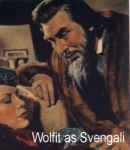 in order to shoot the Long John Silver TV series in Australia.
Shakespearean stage actor Donald Wolfit was brought in at the last minute
to replace him. Wolfit did his best to fill Newton's shoes, but the resulting
film received lukewarm reviews, and I'm convinced it would have been better
received and remembered today had Newton stayed on.
in order to shoot the Long John Silver TV series in Australia.
Shakespearean stage actor Donald Wolfit was brought in at the last minute
to replace him. Wolfit did his best to fill Newton's shoes, but the resulting
film received lukewarm reviews, and I'm convinced it would have been better
received and remembered today had Newton stayed on.  The
larger-than-life character of Svengali would have been a perfect vehicle
for his particular talents—a cross between his own Blackbeard and
Bela Lugosi's magnetic and diabolical zombie master in White Zombie.
(In fact, a younger Lugosi would have been equally well cast in the role!)
Rumor has it that some of Newton's longshots remain in the finished cut
of the film. Having spotted what I think were those shots, I can only
wistfully imagine what might have been! Without Newton: **, with Newton:
****?
The
larger-than-life character of Svengali would have been a perfect vehicle
for his particular talents—a cross between his own Blackbeard and
Bela Lugosi's magnetic and diabolical zombie master in White Zombie.
(In fact, a younger Lugosi would have been equally well cast in the role!)
Rumor has it that some of Newton's longshots remain in the finished cut
of the film. Having spotted what I think were those shots, I can only
wistfully imagine what might have been! Without Newton: **, with Newton:
****?
More to come!